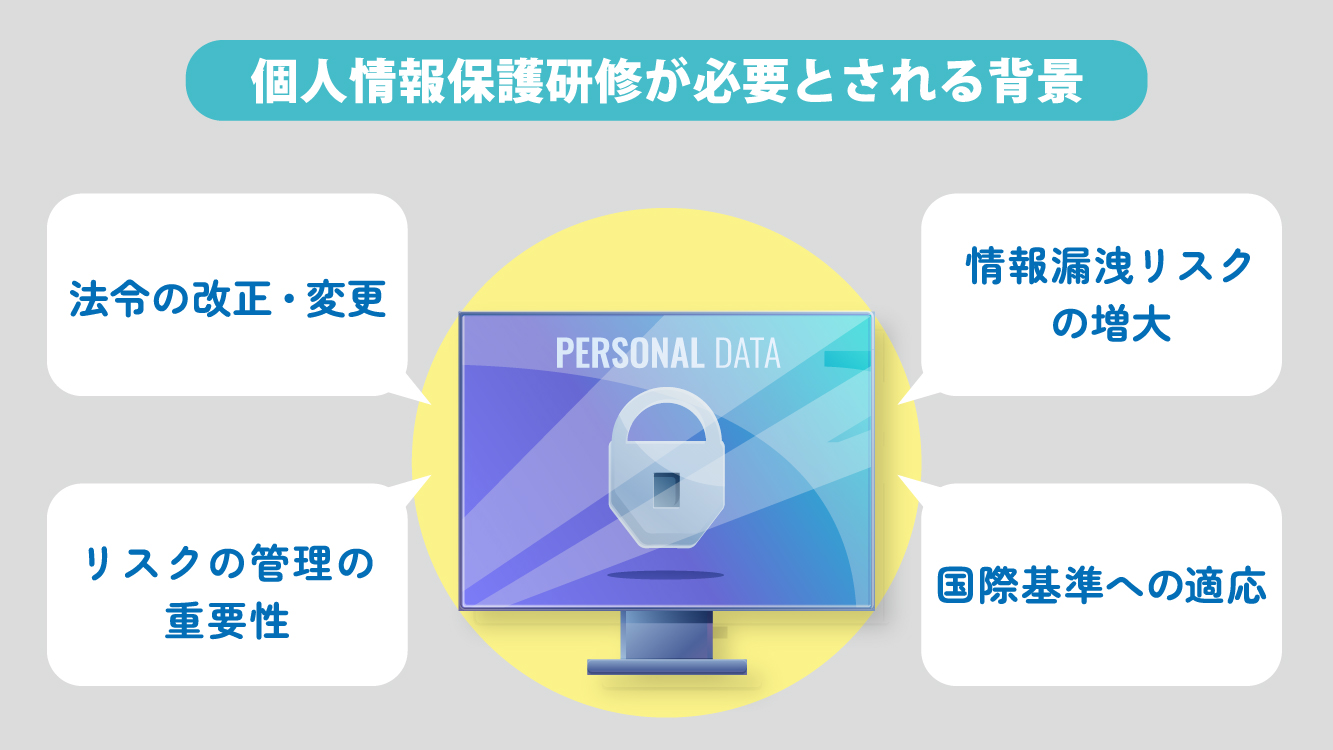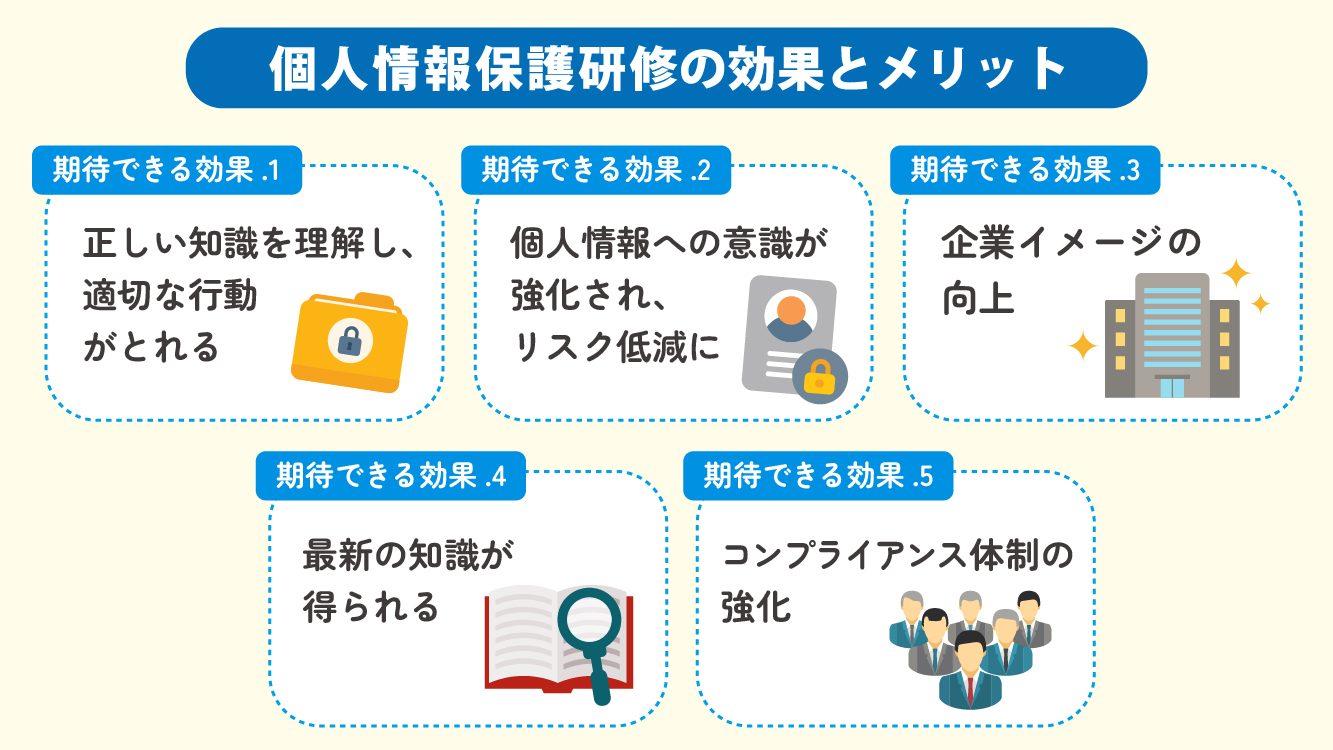2024.08.20
What is the purpose of conducting personal information protection training? Explanation of training content and effects!

Protecting personal information is essential for maintaining corporate credibility and avoiding legal risks. This is because many companies handle vast amounts of personal information, and if that information is not managed properly, they risk losing the trust of customers and employees, as well as facing social and legal sanctions.
To prevent such troubles and ensure smooth corporate activities, training on personal information protection is necessary for all employees.
In this blog, we will explain the significance of personal information protection training, the content of the training, and the effects after the training.
Table of Contents
1. Personal Information Protection Training and the Personal Information Protection Law
2. Background Necessitating Personal Information Protection Training
3. What is Included in Personal Information Protection Training
4. Effects and Benefits of Personal Information Protection Training
5. Conclusion
1. Personal Information Protection Training and Personal Information Protection Law

Personal information protection training is a program in which companies educate employees on the proper handling of personal information and legal obligations. The goal of the training is to raise employees' awareness of personal information protection and enable them to respond appropriately.
Personal information protection training is based on the fundamental principles of the Personal Information Protection Act. The Personal Information Protection Act specifies appropriate handling methods for personal information in detail, and companies must comply with it. First, let's understand the overview of the Personal Information Protection Act.
What is the Personal Information Protection Act?
A law that establishes basic principles and obligations regarding the handling of personal information, promulgated in May 2003 and fully enforced in April 2005.
The Personal Information Protection Law has been revised whenever various challenges arise due to changes in society and advancements in technology.
The 2015 amendment decided to review the personal information protection system every three years. In 2017, the Personal Information Protection Act was applied to all businesses handling personal information. Furthermore, the 2022 legal amendment established the obligation to report in case of a leak and prohibited improper use as the responsibility of businesses, with penalties also being strengthened.
In this way, since the Personal Information Protection Act may be revised periodically, it is important to conduct training regularly and keep knowledge up to date.
2. Background Necessitating Personal Information Protection Training

The background for the need for personal information protection training includes various factors such as the regular amendments to the Personal Information Protection Act mentioned above, the increasing risk of information leaks, and the importance of information management. Below is a summary.
●Amendments and Changes to Laws and Regulations
Every time the Personal Information Protection Law is revised or changed, companies need to understand its contents and comply with it. If a violation of the law is discovered, there are risks of legal penalties and lawsuits, so it is important to understand the latest laws through training and respond appropriately.
●Increased Risk of Information Leakage
Cyber attacks are evolving year by year, and attackers are using more advanced technologies and methods to steal personal information. Additionally, the recent increase in remote work has heightened security vulnerabilities, raising the risk of information leaks.
Therefore, personal information protection training, which can serve as an opportunity to enhance each employee's security awareness and implement measures, can be considered a valuable opportunity.
●Importance of Risk Management
When information leaks occur, a company's credibility is compromised, which can have serious impacts on customers and business partners.
On the other hand, information leaks can be caused by carelessness in business operations or deficiencies in systems and procedures. To minimize these risks, it is necessary to learn appropriate information management methods and security measures through training.
●Adaptation to International Standards
For companies that engage in transactions with overseas partners, there may be cases where compliance with international data protection standards and regulations is required. Failing to address these can lead to a loss of trust with business partners or missed business opportunities. It is reassuring to know that adaptation to such international standards can also be learned through training.
For a company to operate safely and efficiently, it is essential to conduct regular personal information protection training, ensuring that all employees understand the importance of personal information protection and respond appropriately.
3. What is the content of personal information protection training?

So far, we have explained the significance and importance of personal information protection training, but in this chapter, we will introduce the main learning content of the training.
1. Basic Knowledge of Information Security
You will learn the basic knowledge of information security as part of personal information protection, including the three main elements of security (confidentiality, integrity, availability), basic security measures, and how to comply with corporate security policies.
Basic Knowledge of the Personal Information Protection Act
In addition to an overview of the background and purpose of the Personal Information Protection Act, you will also learn about the basic rules regarding the use of personal information and the specific obligations that companies must comply with.
Understanding the Management System for Personal Information
Learn about the organizational structure and operational methods for properly managing personal information.
Causes and Damages of Personal Information Leakage
Understand the main causes of personal information leaks, such as human error, cyber attacks, and improper management, and learn about the damages that result from them. Furthermore, by knowing specific damages such as financial loss and loss of trust, we can contribute to preventing troubles.
5. Proper Handling of Personal Information in Daily Operations (Measures to Prevent Information Leaks)
You will receive an explanation of appropriate preventive measures when handling personal information in daily operations, such as data encryption, access restrictions, and physical management methods for documents and USB drives.
How to Handle Information Leaks and Troubles
Learn the correct responses at each stage, assuming information leaks or trouble may occur.
- Initial Response: Procedures for confirming information, notifying stakeholders, and preventing the escalation of damage.
- Research and Reporting: Methods for post-investigation and reporting to relevant organizations and clients
- Preventive Measures: Analysis of the cause of occurrence and planning and execution of preventive measures
Key Points of the Amendment to the Personal Information Protection Act
We will understand the background and purpose of the amendments to the Personal Information Protection Act, the specific points of the amendments, and the impact on corporate responses and practices, and apply this knowledge to our operations.
What we have introduced here is an example of a personal information protection training program, but through this learning, employees will acquire comprehensive knowledge about personal information protection and will be able to perform appropriate management and responses.
4. Effects and Benefits of Personal Information Protection Training

Personal information protection training is not just an obligation for companies, but an important initiative that leads to sound business activities and the establishment of trust. Here, we will explain the effects and benefits that can be expected from implementing personal information protection training.
Expected Effect 1: Understand correct knowledge and take appropriate actions
By learning about the knowledge and regulations of the Personal Information Protection Act, as well as specific cases, employees will understand "what constitutes personal information" and "how it should be handled." This allows them to recognize the importance of personal information as their own responsibility and to take appropriate and practical actions.
Expected Effects: Strengthened awareness of personal information and reduced risks
By understanding examples of troubles, one can realize how serious the risks of personal information leakage and misuse are, which raises awareness of personal information protection. As a result, employees become more attentive to the handling of personal information, helping to prevent serious incidents before they occur.
Expected Effects.3 > Improvement of Corporate Image
By making efforts to protect personal information well-known, companies can expect an improvement in their reliability and brand image. Additionally, gaining trust from customers and business partners can lead to expanded business opportunities and the acquisition of talented personnel.
Expected Effect 4: Gain the Latest Knowledge
In the field of information security, new threats and risks emerge one after another. By learning about the latest attack methods and cases of unauthorized access in personal information protection training, employees can take effective measures against new risks. Additionally, since laws and regulations regarding personal information protection are frequently revised, training allows for an understanding of the latest trends.
Expected Effects: Strengthening of Compliance System
Through personal information protection training, understanding of laws and regulations deepens, and awareness of compliance permeates the company. Strengthening the compliance system leads to sound corporate operations and becomes a factor for long-term development.
Personal information protection training is an essential initiative for the healthy growth and sustainable development of a company. By ensuring that each employee possesses the correct knowledge and awareness, the overall information security of the company is strengthened, creating an environment where employees can engage in their work with peace of mind.
>What is compliance training? Key points for effective implementation are also explained!
5. Summary

In today's business environment, personal information protection is a critical issue directly linked to corporate credibility.
Therefore, all employees need to undergo personal information protection training to acquire the correct knowledge, practical skills, and a sense of ownership regarding personal information protection.
Let's actively implement personal information protection training to enhance corporate reliability and achieve sustainable growth.
Human Science provides e-learning materials that allow for easy learning of the Personal Information Protection Law. In the field of personal information protection, where legal revisions occur frequently and up-to-date knowledge is required, e-learning materials that facilitate information updates are highly effective. Additionally, they can be studied anytime and anywhere, making them efficient and encouraging active engagement.
You can check the detailed curriculum and sample screens of the teaching materials on Human Science's e-learning site.












